外研英语必修3Module 3 The Violence of Nature Listening and Vocabulary课件(共25张PPT无听力音频)
文档属性
| 名称 | 外研英语必修3Module 3 The Violence of Nature Listening and Vocabulary课件(共25张PPT无听力音频) |
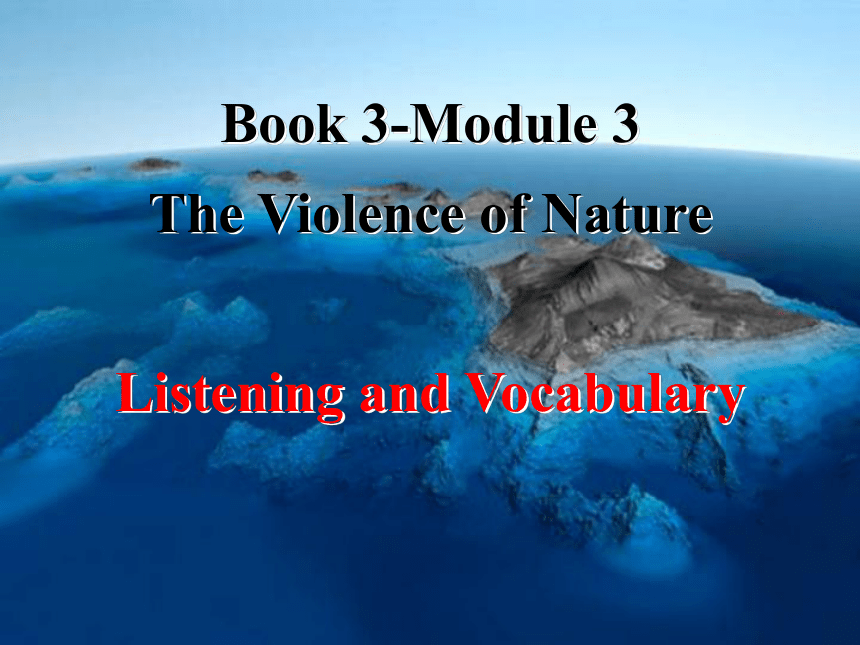
|
|
| 格式 | zip | ||
| 文件大小 | 1.7MB | ||
| 资源类型 | 教案 | ||
| 版本资源 | 外研版 | ||
| 科目 | 英语 | ||
| 更新时间 | 2020-04-03 00:00:00 | ||
图片预览

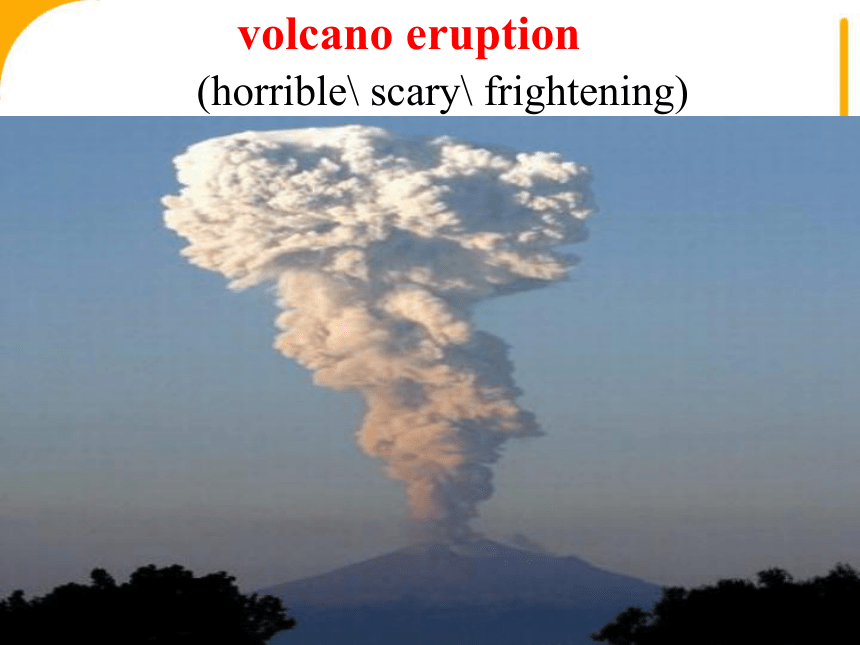
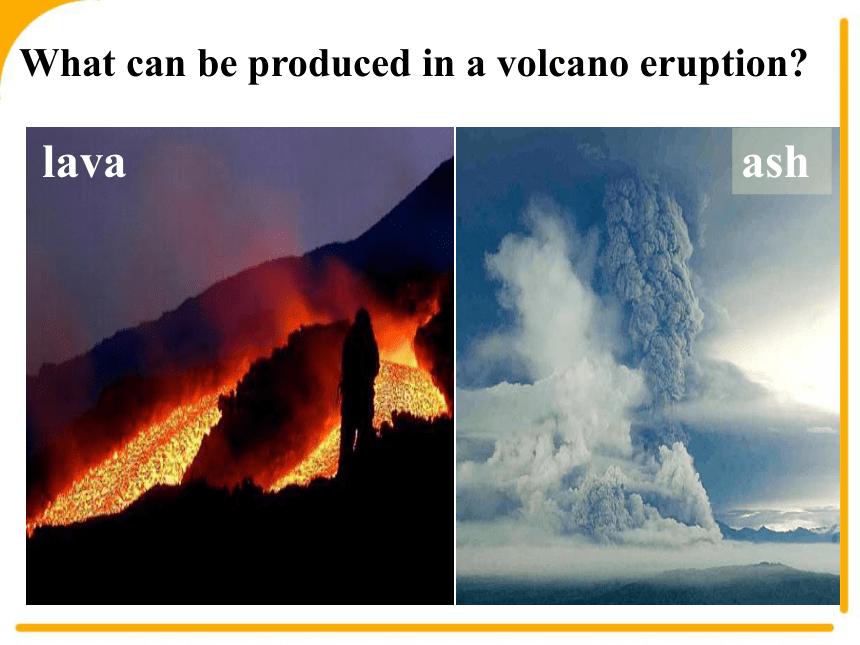
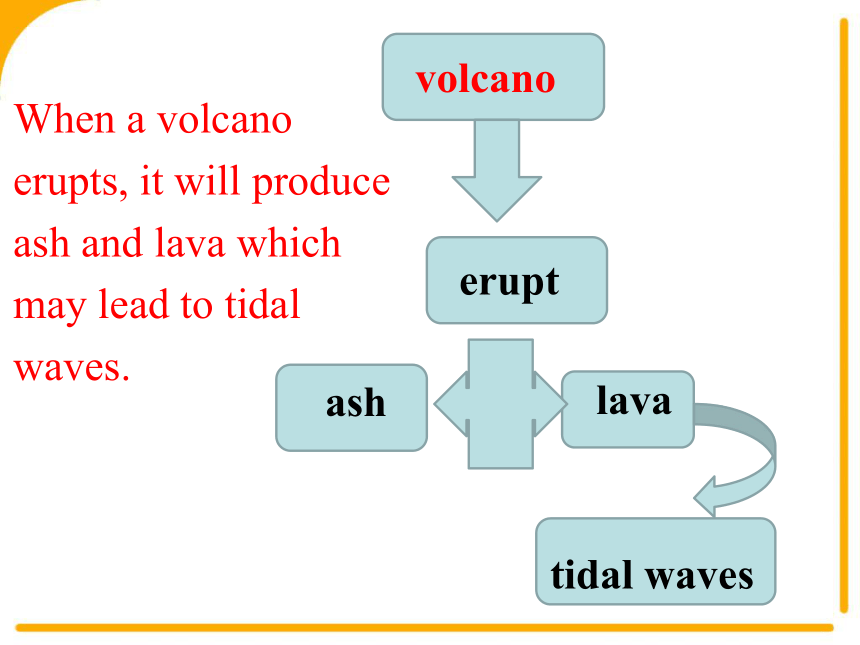
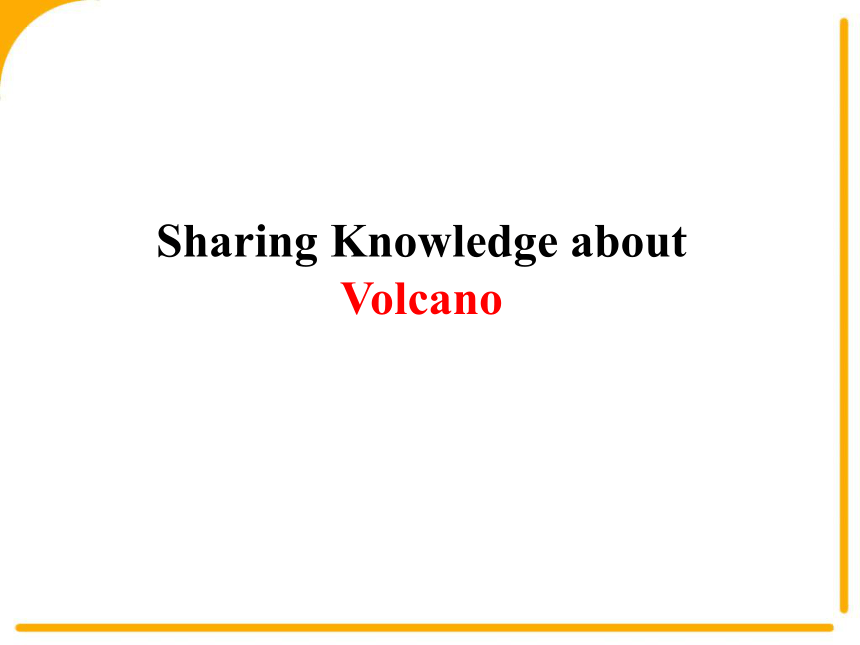
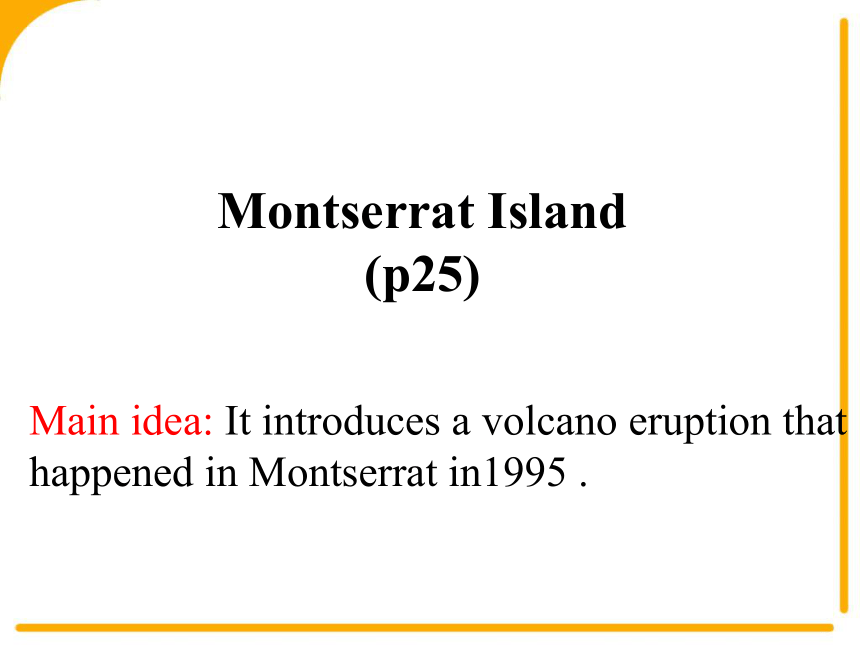
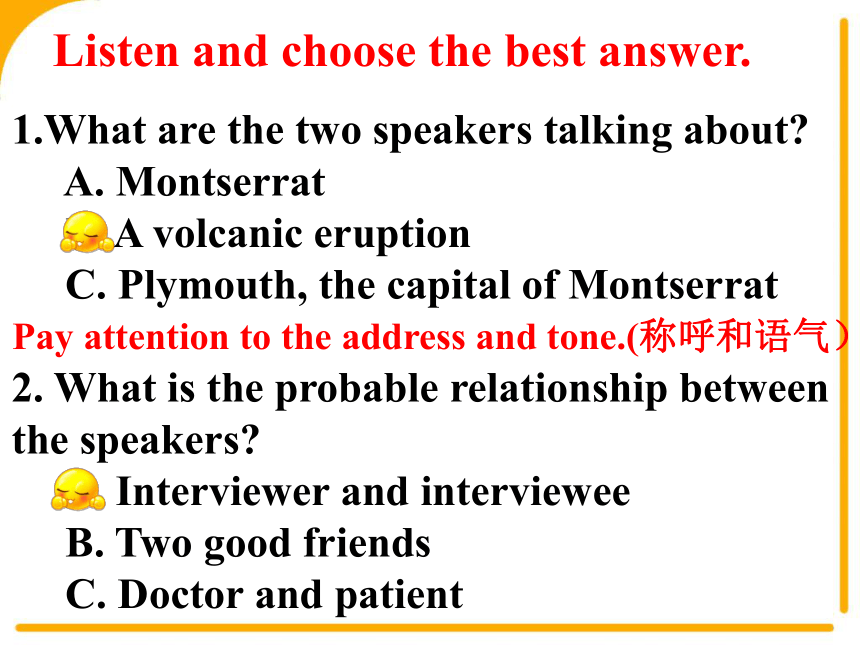

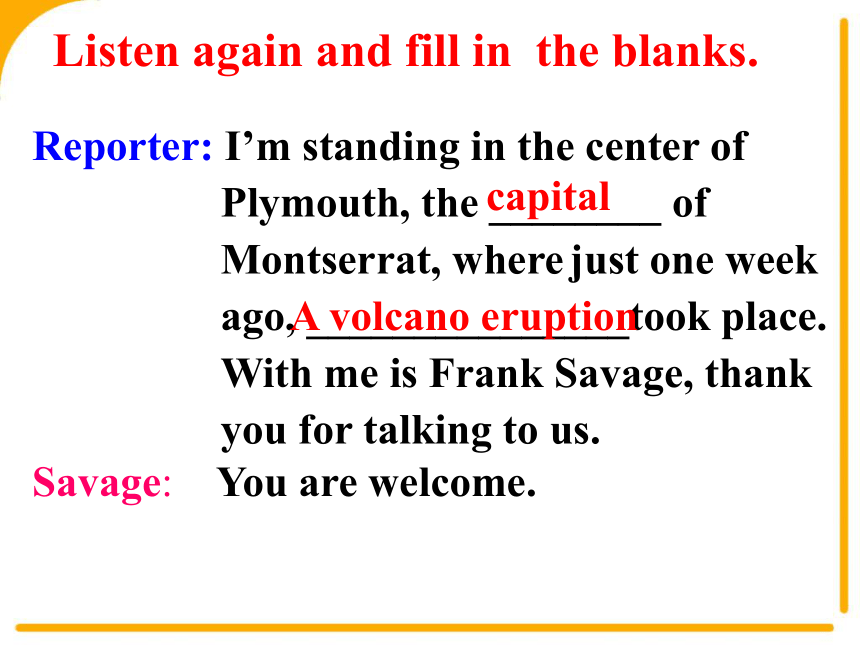
文档简介
(共25张PPT)
Book 3-Module 3
The Violence of Nature
Listening and Vocabulary
volcano eruption
(horrible\ scary\ frightening)
What can be produced in a volcano eruption?
lava
ash
volcano
erupt
ash
lava
tidal waves
When a volcano erupts, it will produce ash and lava which may lead to tidal waves.
Sharing Knowledge about Volcano
Montserrat Island
(p25)
Main idea: It introduces a volcano eruption that happened in Montserrat in1995 .
What are the two speakers talking about?
A. Montserrat
B. A volcanic eruption
C. Plymouth, the capital of Montserrat
2. What is the probable relationship between the speakers?
A. Interviewer and interviewee
B. Two good friends
C. Doctor and patient
Pay attention to the address and tone.(称呼和语气)
Listen and choose the best answer.
Listen again and fill in the blanks.
Reporter: I’m standing in the center of Plymouth, the ________ of Montserrat, where just one week ago, _______________took place. With me is Frank Savage, thank you for talking to us.
Savage: You are welcome.
capital
A volcano eruption
Listen again and fill in the blanks.
Reporter: What exactly happened ______?
Savage: Well, the volcano erupted, and ash and lava poured down the mountain toward the sea. ___________, there are several villages in its path.
Reporter: That’s terrible. Was anybody _____?
last week
Unfortunately
hurt
Savage: No. Luckily, we had plenty of ______ and I told people who lived in the path of the ash and lava _________ the island. We managed to get half the population to another island _______the eruption took place.
warning
to leave
before
Reporter: Why are you still here?
Savage: Well, I’m still working because there’s a lot to do.
Reporter: How many people live on the island?
Savage: Eleven thousand people live here and about ___________people have left.
six thousand
Reporter: Which areas are the most dangerous?
Savage: Well, the most dangerous places are between the volcano and the sea. There are a lot of village there. And it was very dangerous. ____, hundreds of houses _________ when the lava reached them.
Sadly
caught fire
Reporter: Oh, I’m very sorry to hear that.
Savage: Thankfully, _______was killed.
Reporter: Are the house still on fire?
Savage: No. __________, we put all the fires out quite quickly.
no one
Fortunately
Reporter: That’s very good news. Well, it’s a beautiful sunny day here in Plymouth. Does this mean that the danger is over?
Savage: No! The volcano could _________! People must understand that it is still very dangerous and they can’t __________ their houses.
go back to
erupt again
Reporter: OK-so that’s the message from the governor-don’t go back to your houses. When will be able to _________?
Savage: we don’t know at the moment. Hopefully, it won’t be too long.
Reporter: Thank you for your time, Mr Savage.
Savage: Thank you.
return home
How to describe a disaster that has happened?
Event
Time and place
Damage or results
Rescue work
tidal waves
What can we do?
Depend on technology to predict.
Give a warning ahead of time.
Protect the environment and live in harmony with nature.
Volcano Facts
Volcanoes are classified as being active, dormant or extinct.(活火山,休眠火山,死火山)
There are 1,511 active volcanoes in the world.
The most active volcano in the world is Kilauea(Hawaii), which has erupted 50 times since 1,700.
The largest volcano in the world is Mauna Loa(Hawaii).
The highest volcano in the world is Ojos del Salado (Chile, at 6,887 metres).
When a volcano erupts, the lava has a temperature of 1150-1350℃.
Ash can be sent 40km into the air when a volcano erupts.
500 million people in the word live dangerously close to active volcanoes.
Indonesia is the country with most volcanoes-86 have erupted in the history.
The eruption of Tambora in Indonesia in 1815 was the worst disaster in human terms-92,000 people died as a direct effect (lava, tidal waves).
Effects of Volcano Eruption
Harms and Benefits
A volcano eruption can cause other disasters, such as tidal waves, mudslide. It can destroy villages, roads and people.
It can create beautiful landscapes and is good for tourism. Besides, volcanic ash can greatly improves soil.
Book 3-Module 3
The Violence of Nature
Listening and Vocabulary
volcano eruption
(horrible\ scary\ frightening)
What can be produced in a volcano eruption?
lava
ash
volcano
erupt
ash
lava
tidal waves
When a volcano erupts, it will produce ash and lava which may lead to tidal waves.
Sharing Knowledge about Volcano
Montserrat Island
(p25)
Main idea: It introduces a volcano eruption that happened in Montserrat in1995 .
What are the two speakers talking about?
A. Montserrat
B. A volcanic eruption
C. Plymouth, the capital of Montserrat
2. What is the probable relationship between the speakers?
A. Interviewer and interviewee
B. Two good friends
C. Doctor and patient
Pay attention to the address and tone.(称呼和语气)
Listen and choose the best answer.
Listen again and fill in the blanks.
Reporter: I’m standing in the center of Plymouth, the ________ of Montserrat, where just one week ago, _______________took place. With me is Frank Savage, thank you for talking to us.
Savage: You are welcome.
capital
A volcano eruption
Listen again and fill in the blanks.
Reporter: What exactly happened ______?
Savage: Well, the volcano erupted, and ash and lava poured down the mountain toward the sea. ___________, there are several villages in its path.
Reporter: That’s terrible. Was anybody _____?
last week
Unfortunately
hurt
Savage: No. Luckily, we had plenty of ______ and I told people who lived in the path of the ash and lava _________ the island. We managed to get half the population to another island _______the eruption took place.
warning
to leave
before
Reporter: Why are you still here?
Savage: Well, I’m still working because there’s a lot to do.
Reporter: How many people live on the island?
Savage: Eleven thousand people live here and about ___________people have left.
six thousand
Reporter: Which areas are the most dangerous?
Savage: Well, the most dangerous places are between the volcano and the sea. There are a lot of village there. And it was very dangerous. ____, hundreds of houses _________ when the lava reached them.
Sadly
caught fire
Reporter: Oh, I’m very sorry to hear that.
Savage: Thankfully, _______was killed.
Reporter: Are the house still on fire?
Savage: No. __________, we put all the fires out quite quickly.
no one
Fortunately
Reporter: That’s very good news. Well, it’s a beautiful sunny day here in Plymouth. Does this mean that the danger is over?
Savage: No! The volcano could _________! People must understand that it is still very dangerous and they can’t __________ their houses.
go back to
erupt again
Reporter: OK-so that’s the message from the governor-don’t go back to your houses. When will be able to _________?
Savage: we don’t know at the moment. Hopefully, it won’t be too long.
Reporter: Thank you for your time, Mr Savage.
Savage: Thank you.
return home
How to describe a disaster that has happened?
Event
Time and place
Damage or results
Rescue work
tidal waves
What can we do?
Depend on technology to predict.
Give a warning ahead of time.
Protect the environment and live in harmony with nature.
Volcano Facts
Volcanoes are classified as being active, dormant or extinct.(活火山,休眠火山,死火山)
There are 1,511 active volcanoes in the world.
The most active volcano in the world is Kilauea(Hawaii), which has erupted 50 times since 1,700.
The largest volcano in the world is Mauna Loa(Hawaii).
The highest volcano in the world is Ojos del Salado (Chile, at 6,887 metres).
When a volcano erupts, the lava has a temperature of 1150-1350℃.
Ash can be sent 40km into the air when a volcano erupts.
500 million people in the word live dangerously close to active volcanoes.
Indonesia is the country with most volcanoes-86 have erupted in the history.
The eruption of Tambora in Indonesia in 1815 was the worst disaster in human terms-92,000 people died as a direct effect (lava, tidal waves).
Effects of Volcano Eruption
Harms and Benefits
A volcano eruption can cause other disasters, such as tidal waves, mudslide. It can destroy villages, roads and people.
It can create beautiful landscapes and is good for tourism. Besides, volcanic ash can greatly improves soil.
